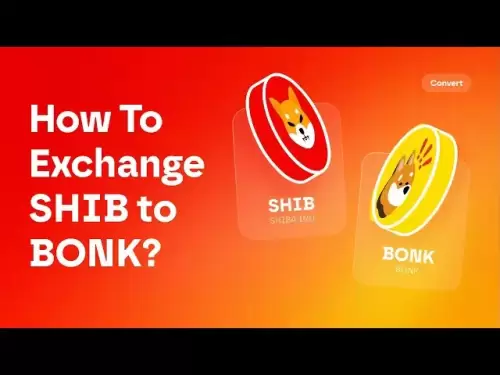-
 Bitcoin
Bitcoin $113600
-0.05% -
 Ethereum
Ethereum $3457
-1.05% -
 XRP
XRP $2.860
-4.17% -
 Tether USDt
Tether USDt $0.9998
-0.02% -
 BNB
BNB $747.3
-1.03% -
 Solana
Solana $161.0
-1.78% -
 USDC
USDC $0.9998
-0.03% -
 TRON
TRON $0.3259
-0.19% -
 Dogecoin
Dogecoin $0.1959
-1.69% -
 Cardano
Cardano $0.7227
0.85% -
 Hyperliquid
Hyperliquid $38.34
-0.83% -
 Sui
Sui $3.435
-0.88% -
 Stellar
Stellar $0.3796
-1.29% -
 Chainlink
Chainlink $16.02
0.16% -
 Bitcoin Cash
Bitcoin Cash $540.5
0.48% -
 Hedera
Hedera $0.2406
1.01% -
 Ethena USDe
Ethena USDe $1.001
0.03% -
 Avalanche
Avalanche $21.19
-1.37% -
 Toncoin
Toncoin $3.625
0.71% -
 UNUS SED LEO
UNUS SED LEO $8.962
0.03% -
 Litecoin
Litecoin $108.1
0.88% -
 Shiba Inu
Shiba Inu $0.00001207
-0.48% -
 Polkadot
Polkadot $3.576
0.66% -
 Uniswap
Uniswap $9.049
0.64% -
 Monero
Monero $298.9
0.81% -
 Dai
Dai $0.0000
0.00% -
 Bitget Token
Bitget Token $4.285
-0.11% -
 Pepe
Pepe $0.00001034
-1.16% -
 Cronos
Cronos $0.1302
-1.26% -
 Aave
Aave $257.5
1.46%
How can blockchain games attract traditional game players to participate?
Blockchain games can attract traditional players by offering NFT ownership, familiar game mechanics, rewards, strong communities, education, influencer collaborations, and user-friendly interfaces.
Apr 14, 2025 at 07:14 pm
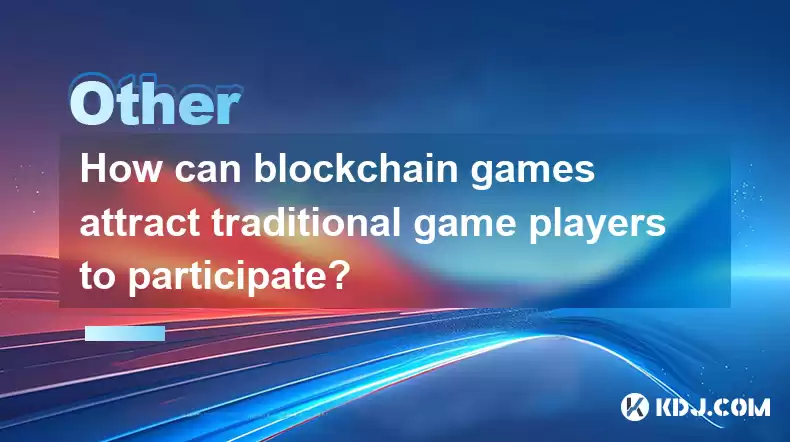
How can blockchain games attract traditional game players to participate?
Blockchain technology has revolutionized various industries, including gaming. With the rise of blockchain games, developers are constantly seeking ways to attract traditional game players to participate in this new gaming paradigm. This article explores several strategies that can be employed to draw in traditional gamers and integrate them into the world of blockchain gaming.
Enhancing Gameplay Experience with Unique Features
One of the primary ways to attract traditional gamers to blockchain games is by enhancing the gameplay experience with unique features. Blockchain games can offer players true ownership of in-game assets through non-fungible tokens (NFTs). This means that players can own, trade, and even sell their digital items outside the game ecosystem.
For example, in a traditional game, a player might spend hours acquiring a rare sword, but that sword has no value outside the game. In a blockchain game, that same sword could be an NFT, allowing the player to sell it on a marketplace for real-world currency. This sense of ownership and potential for profit can be a significant draw for traditional gamers.
Additionally, blockchain games can implement decentralized governance, allowing players to have a say in the game's development and direction. This can be achieved through voting mechanisms where players can propose and vote on changes to the game. This level of involvement can make traditional gamers feel more connected to the game and its community.
Integrating Familiar Game Mechanics
Another effective strategy is to integrate familiar game mechanics into blockchain games. Many traditional gamers are accustomed to certain gameplay styles and genres, such as first-person shooters, role-playing games, or strategy games. By incorporating these familiar mechanics into blockchain games, developers can create a more comfortable and engaging experience for traditional gamers.
For instance, a blockchain game could be designed as a multiplayer online battle arena (MOBA) with the added twist of NFT-based hero skins and items. This way, players can enjoy the familiar MOBA gameplay while also benefiting from the unique features of blockchain technology.
Offering Rewards and Incentives
Offering rewards and incentives is another powerful way to attract traditional gamers to blockchain games. Many blockchain games operate on a play-to-earn model, where players can earn cryptocurrency or NFTs by participating in the game. This model can be particularly appealing to traditional gamers who are looking for ways to monetize their gaming time.
For example, a blockchain game might reward players with tokens for completing daily quests or achieving high scores in competitive modes. These tokens can then be used within the game or traded on external marketplaces. By providing tangible rewards, blockchain games can incentivize traditional gamers to give them a try.
Building Strong Communities
A strong community is essential for any game's success, and this is especially true for blockchain games. By fostering a vibrant and supportive community, blockchain games can attract traditional gamers who value social interaction and collaboration.
Developers can achieve this by creating forums, social media groups, and in-game chat systems where players can connect, share tips, and discuss the game. Additionally, hosting community events, tournaments, and giveaways can help build a sense of belonging and excitement around the game.
Educating Players About Blockchain Technology
Many traditional gamers may be unfamiliar with blockchain technology and its benefits. Educating players about how blockchain works and how it can enhance their gaming experience is crucial for attracting them to blockchain games.
Developers can create educational content such as blog posts, videos, and in-game tutorials that explain the basics of blockchain and its applications in gaming. By demystifying the technology and highlighting its advantages, developers can help traditional gamers feel more comfortable and confident in trying out blockchain games.
Collaborating with Influencers and Streamers
Collaborating with influencers and streamers is another effective way to attract traditional gamers to blockchain games. Influencers and streamers have large followings and can introduce blockchain games to a wide audience of traditional gamers.
Developers can partner with influencers to create sponsored content, such as gameplay videos, live streams, and reviews. These collaborations can help build trust and credibility with traditional gamers, encouraging them to try out the game.
Ensuring Accessibility and User-Friendliness
Finally, ensuring that blockchain games are accessible and user-friendly is essential for attracting traditional gamers. Many traditional gamers may be put off by the technical complexity of blockchain technology.
Developers can address this by creating intuitive user interfaces, providing clear instructions, and offering customer support. Additionally, integrating with popular wallets and marketplaces can make it easier for traditional gamers to get started with blockchain games.
By focusing on these strategies, blockchain games can successfully attract traditional gamers and integrate them into the exciting world of decentralized gaming.
Frequently Asked Questions
Q: Can traditional gamers play blockchain games without understanding the underlying technology?
A: Yes, many blockchain games are designed to be user-friendly and accessible, allowing traditional gamers to enjoy the gameplay without needing to understand the technical details of blockchain technology. Developers often provide tutorials and guides to help players get started.
Q: Are there any risks associated with playing blockchain games?
A: Like any online activity, there are potential risks associated with playing blockchain games, such as scams and security breaches. However, reputable blockchain games implement strong security measures and educate players on best practices to minimize these risks.
Q: How can traditional gamers benefit from playing blockchain games?
A: Traditional gamers can benefit from playing blockchain games in several ways, including earning cryptocurrency and NFTs, owning and trading in-game assets, and participating in decentralized governance. These benefits can enhance the gaming experience and provide additional value.
Q: What types of blockchain games are most appealing to traditional gamers?
A: Traditional gamers are often drawn to blockchain games that incorporate familiar genres and mechanics, such as first-person shooters, role-playing games, and strategy games. Games that offer a seamless blend of traditional gameplay with blockchain features tend to be the most appealing.
Disclaimer:info@kdj.com
The information provided is not trading advice. kdj.com does not assume any responsibility for any investments made based on the information provided in this article. Cryptocurrencies are highly volatile and it is highly recommended that you invest with caution after thorough research!
If you believe that the content used on this website infringes your copyright, please contact us immediately (info@kdj.com) and we will delete it promptly.
- SOLF Token vs. BONK: Predicting a $300 Solana in 2025?
- 2025-08-03 16:30:16
- Sei, Injective, and Bitcoin Dominance: Navigating the Crypto Landscape
- 2025-08-03 16:50:15
- UK Lifts Ban on Crypto ETNs: Bitcoin Set for Retail Boom?
- 2025-08-03 16:30:16
- Coin Master Free Spins: Maximize Your Game with Daily Links (August 2025)
- 2025-08-03 16:50:15
- Bitcoin Liquidity, Osmosis Zone, and Investor Interest: A Deep Dive
- 2025-08-03 15:16:44
- Web3, Sports, and Computing Power: A New Ballgame
- 2025-08-03 15:16:44
Related knowledge
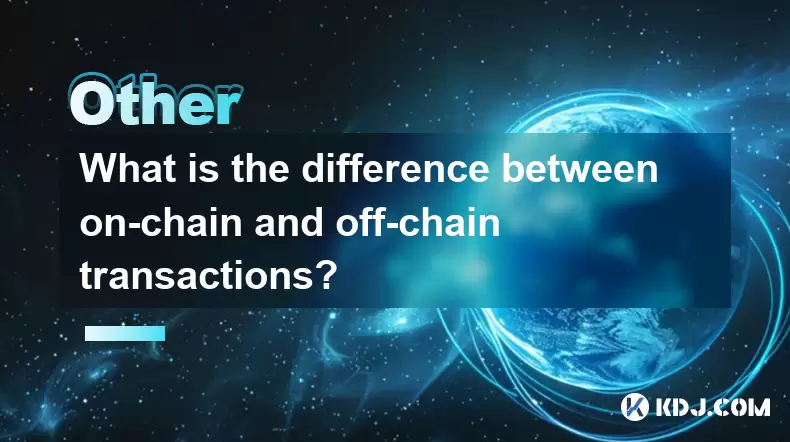
What is the difference between on-chain and off-chain transactions?
Aug 02,2025 at 04:22pm
Understanding On-Chain TransactionsOn-chain transactions refer to digital asset transfers that are recorded directly on a blockchain ledger. These tra...
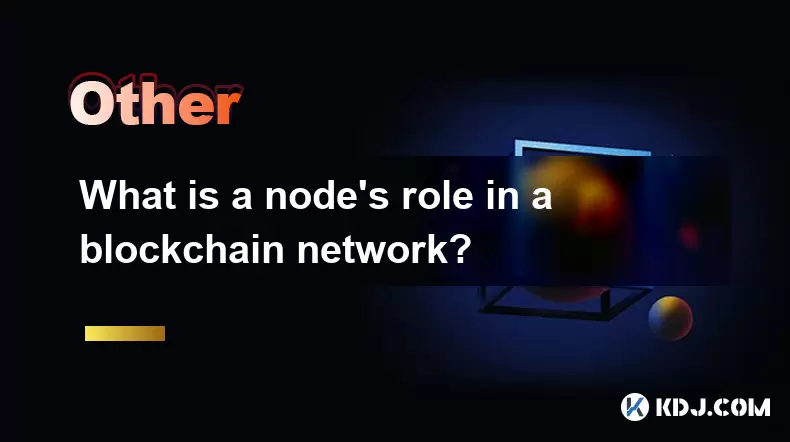
What is a node's role in a blockchain network?
Aug 03,2025 at 03:16pm
Understanding the Function of a Node in a Blockchain NetworkA node is a fundamental component of any blockchain network, acting as a participant that ...
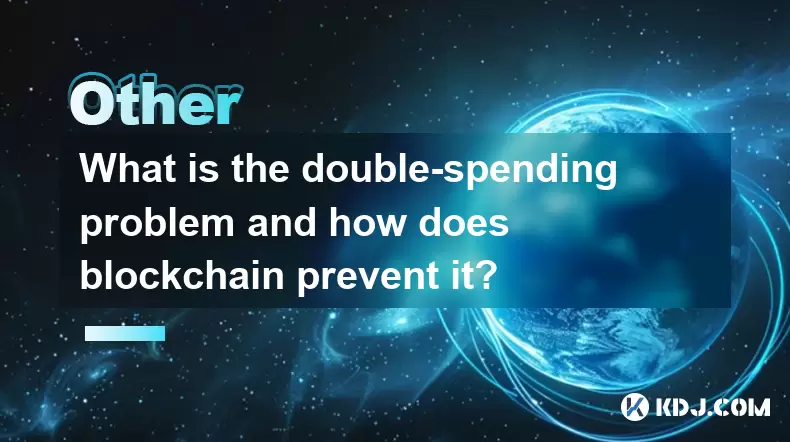
What is the double-spending problem and how does blockchain prevent it?
Aug 02,2025 at 01:07pm
Understanding the Double-Spending ProblemThe double-spending problem is a fundamental challenge in digital currency systems where the same digital tok...
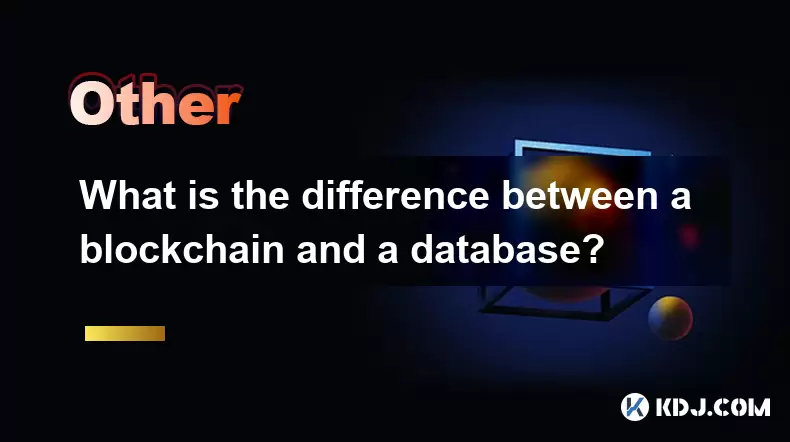
What is the difference between a blockchain and a database?
Aug 01,2025 at 09:36pm
Understanding the Core Structure of a BlockchainA blockchain is a decentralized digital ledger that records data in a series of immutable blocks linke...
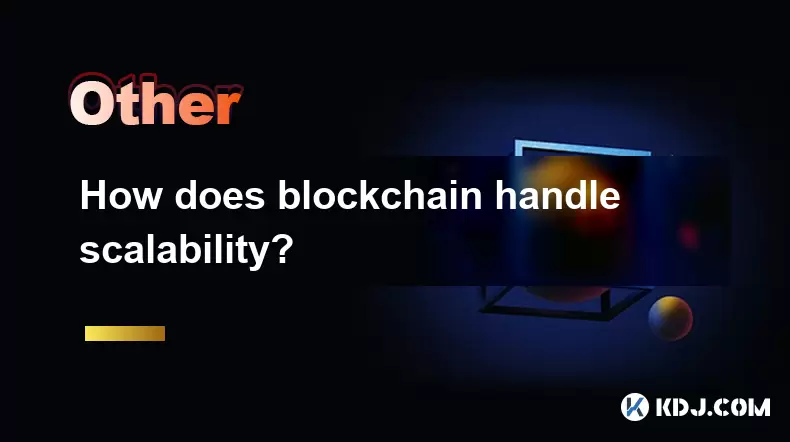
How does blockchain handle scalability?
Aug 02,2025 at 02:58pm
Understanding Blockchain Scalability ChallengesBlockchain scalability refers to a network's ability to handle an increasing volume of transactions wit...
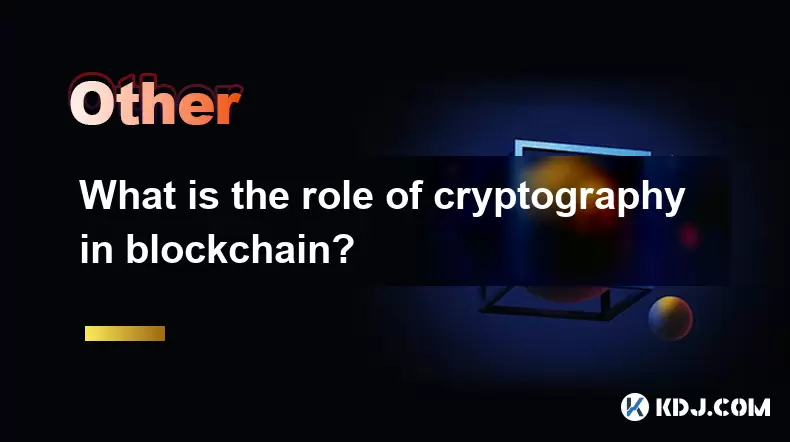
What is the role of cryptography in blockchain?
Aug 03,2025 at 03:42pm
Understanding the Foundation of Blockchain SecurityCryptography is the cornerstone of blockchain technology, providing the essential tools to ensure d...

What is the difference between on-chain and off-chain transactions?
Aug 02,2025 at 04:22pm
Understanding On-Chain TransactionsOn-chain transactions refer to digital asset transfers that are recorded directly on a blockchain ledger. These tra...

What is a node's role in a blockchain network?
Aug 03,2025 at 03:16pm
Understanding the Function of a Node in a Blockchain NetworkA node is a fundamental component of any blockchain network, acting as a participant that ...

What is the double-spending problem and how does blockchain prevent it?
Aug 02,2025 at 01:07pm
Understanding the Double-Spending ProblemThe double-spending problem is a fundamental challenge in digital currency systems where the same digital tok...

What is the difference between a blockchain and a database?
Aug 01,2025 at 09:36pm
Understanding the Core Structure of a BlockchainA blockchain is a decentralized digital ledger that records data in a series of immutable blocks linke...

How does blockchain handle scalability?
Aug 02,2025 at 02:58pm
Understanding Blockchain Scalability ChallengesBlockchain scalability refers to a network's ability to handle an increasing volume of transactions wit...

What is the role of cryptography in blockchain?
Aug 03,2025 at 03:42pm
Understanding the Foundation of Blockchain SecurityCryptography is the cornerstone of blockchain technology, providing the essential tools to ensure d...
See all articles

























